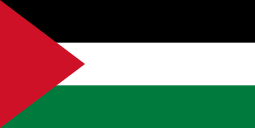Leila Farsakh
Leila Farsakh (Arabic: ليلى فرسخ) (born 1967) is a Palestinian political economist who was born in Jordan and is an Associate Professor of Political Science at University of Massachusetts Boston.[1] Her area of expertise is Middle East Politics, Comparative Politics, and the Politics of the Arab-Israeli Conflict. Farsakh holds a MPhil from the University of Cambridge, UK (1990) and a PhD from the University of London (2003).[1]
| Part of a series on |
| Palestinians |
|---|
 |
| Demographics |
| Politics |
|
| Religion / religious sites |
| Culture |
| List of Palestinians |
Farsakh conducted post-doctoral research at Harvard’s Center for Middle Eastern Studies, and is also a research affiliate at the Center for International Studies at the Massachusetts Institute of Technology.[1]
She has worked with a number of organizations, including the Organisation for Economic Co-operation and Development in Paris (1993 - 1996) and the Palestine Economic Policy Research Institute in Ramallah (1998 - 1999).[2]
In 2001 she won the Peace and Justice Award from the Cambridge Peace Commission in Cambridge, Massachusetts.[2]
Farsakh is the Project Co-Director for Jerusalem 2050, a problem-solving project jointly sponsored by Massachusetts Institute of Technology's Department of Urban Studies and Planning and the Center for International Studies.[3] She has written extensively on issues related to the Palestinian economy and the Oslo peace process, international migration and regional integration.[3]
Farsakh was also a member of the Board at the non-governmental organization RESIST (www.resistinc.org), founded in 1967 to provide grant money and support to grassroots movements advocating for social change.[4]
Interview
- The Deteriorating Political Economy of Palestine A video interview with Leila Farsakh, interview conducted by Saul Landau on "Hot Talk" radio Cal Poly Pomona, March 15, 2004.
Published works
Books (partial list)
- Palestinian Labour Migration to Israel: Labour, Land, and Occupation (2005). Taylor & Francis Ltd, United Kingdom. ISBN 0-415-33356-3.[5]
- Commemorating the Naksa, Evoking the Nakba, (guest editor), Electronic Journal of Middle Eastern Studies, Spring 2008, MIT, Boston, 2008.
- Development Strategies, Employment and International Migration, (co-edited with David O’Connor), OECD Development Center Publications, Paris, 1996.
- Palestinian Employment in Israel: 1967-1997 (1998). Ramallah.
Articles (partial list)
- “The One State Solution and the Israeli-Palestinian Conflict: Palestinian Challenges and Prospects”, Middle East Journal, vol.64 no.1, winter 2011, pp. 20–45.
- “Introduction – Engaging Islam: Feminisms, Religiosities and Self-Determinations” co-authored with Elora Chowdhury and Rajini Srikanth, International Feminist Journal of Politics, vol. 10, no.4 December 2008, pp. 439–454.
- A Legacy of Promise for Muslims, the Boston Globe, co-authored with Elora Chowdhury, 11 September 2007.
- with others: Statement: One country, one state 9 July 2007, Electronic Intifada,
- Time for a Bi-National State, March 2007 Le Monde diplomatique (also published in: Israel-Palestine: Time for a bi-national state, 20 March 2007 Electronic Intifada,
- The Economics of Israeli Occupation: What is Colonial about it?, 2006
- Independence, Cantons, or Bantustans: Whither the Palestinian State? vol.59, no.2, Spring 2005, Middle East Journal
- The Political Economy of Agrarian Change in the West Bank and Gaza Strip, Robert Schuman Centre for Advanced Studies Working Paper, European University Institute, 2004.
- Israel: An Apartheid State? November 2003, Le Monde diplomatique
- Palestinian Labor Flows to Israel: A Finished Story?, issue 125, Autumn 2002, Journal of Palestine Studies,
- The Palestinian economy and the Oslo “Peace Process", the Trans-Arab Research Institute, 2001
- Economic Viability of a Palestinian State in the West Bank and Gaza Strip: Is it Possible without Territorial Integrity and Sovereignty?, MIT Electronic Journal of Middle East Studies, May 2001
- Under Siege: Closure, Separation and the Palestinian Economy 217 - Winter 2000, MERIP
Public Lectures
- Notes on Analogy: Israel and Apartheid, at the Center for Middle Eastern Studies at Harvard University, 16 March 2007.
- Beyond Apartheid in Israel/Palestine: The Reality on the Ground & Lessons from South Africa, at Northeastern University in Boston, 19 November 2006.[6]
- "Palestinian Labor Flow to Israel: Is it Over?", at the Center for Middle Eastern Studies at Harvard University, 19 February 2002.[7]
- Palestinian Perspective, Chomsky Lecture on Middle East Crises, December 14, 2000
References
- "UMass Boston Political Scientist Focuses on a New Civic Blueprint for Jerusalem". University of Massachusetts Boston. Retrieved 2007-09-11.
- "Political Science Faculty". University of Massachusetts Boston. Archived from the original on 2008-10-13. Retrieved 2007-09-11.
- "People". Jerusalem 2050. Retrieved 2007-09-11.
- "Board & Staff". RESIST. Archived from the original on 2007-07-15. Retrieved 2007-09-11.
- David Bartram (2007). "Book Reviews: Palestinian and the Arab-Israeli Conflict". International Journal of Middle East Studies. Cambridge University Press. 39 (3): 475. doi:10.1017/S002074380707064X. Retrieved 2007-09-11.
- Matt Horton (March 2007). "Waging Peace". Washington Report on Middle East Affairs. Retrieved 2007-09-11.
- "Middle East Forum Event Archive". Harvard University. Archived from the original on 2008-05-16. Retrieved 2007-09-11.